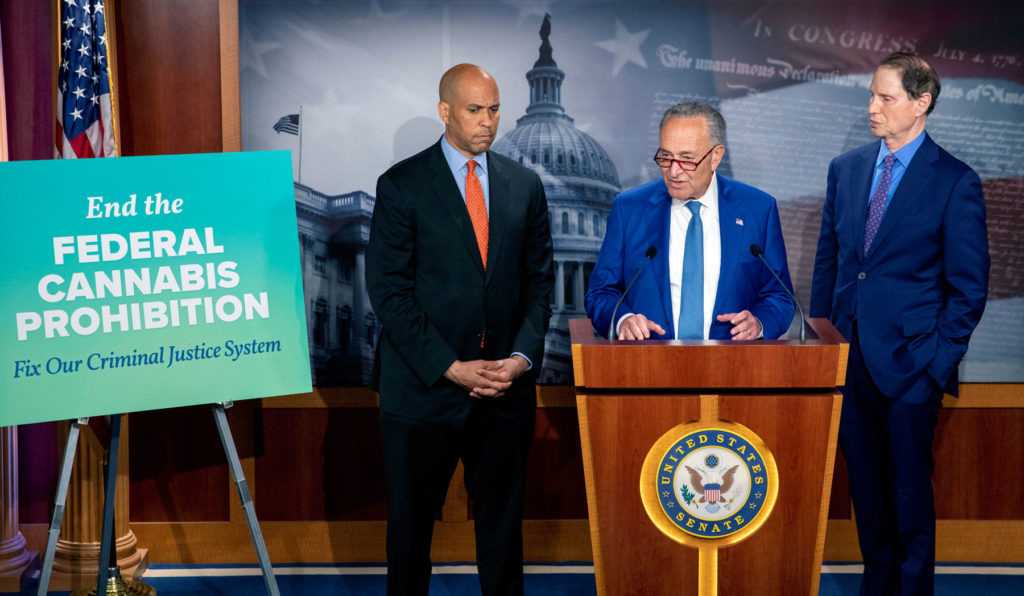A key cannabis bill now before the U.S. Senate would establish the legality of all forms of THC naturally present in hemp, adding varieties so far not addressed, then raise the overall limit for THC in hemp plants from 0.3% to 0.7%.
The proposed measure, the Cannabis Administration and Opportunity Act (CAOA), targets those and several other hemp matters not covered in current legislation.
Delta-9, the more well-known form of THC that is abundant in marijuana plants, also occurs naturally in trace amounts in the industrial form of cannabis, and is recognized in existing laws. But hemp also contains negligible amounts of naturally-occurring delta-8 and delta-10 THC, and tetrahydrocannabinolic acid, forms which are not addressed by current legislation.
More THC means more CBD
Stakeholders have pushed for a limit of a full 1.0% total for all forms of THC present in hemp “on the field,” but even the increase to 0.7% would help CBD producers because CBD in hemp plants rises in proportion to THC, making production more efficient. That would let the U.S. gain ground in international trade where it competes against countries in Asia and Latin America that have broken with the generally followed international THC limit of 0.3% to set a more enlightened defining line between hemp and marijuana at 1.0%.
The increase would also provide greater security to American hemp growers, who in some jurisdictions must destroy crops that go beyond the current 0.3% THC limit.
About the CAOA
The CAOA is a broad legislative initiative to decriminalize cannabis by removing it from the Controlled Substances Act and empowering states to create their own cannabis laws. The 163-page bill covers a wide range of cannabis issues with the aim of ending the decades-long federal cannabis prohibition, regulating cannabis, supporting medical research and reinvesting in disadvantaged communities the authors say were unfairly targeted in the War on Drugs.
“It lets the states manage their own cannabis affairs while not letting any state interfere with another state’s cannabis policies,” Sanford Stein of Chicago-based Cannabis Law LLC told HempToday.
The bill would recognize the legalization of cannabis by the states and decriminalize, regulate, and tax businesses, offering provisions related to justice, immigration, and enforcement; small business administration; public health; education infrastructure; labor; veterans; banking, housing; and community development.
Chance of passage
Observers have said only incremental reform on cannabis is expected in the near future, especially if the Democrats lose the Senate in the 2022 midterm elections.
“No hearings are scheduled, and nobody is rocking the boat any further before the midterm elections in November,” Stein said. “Depending on what happens in the election, Democrats may try to push the CAOA in the ‘lame duck’ session that follows, but more likely they will look to a re-introduction in the new Congress that starts in January.”
Other proposed laws could solve some problems for the hemp industry. Much-needed clear banking rules, for example, could be resolved through the Secure and Fair Enforcement Banking Act (SAFE Act), which would finally permit financial institutions to service hemp and marijuana companies without fear of reprisal.
While CAOA’s sponsors, Sen. Ron Wyden of Oregon, Sen. Cory Booker of New Jersey and Sen. Chuck Schumer of New York, have said they will not support the SAFE Act in the absence of broader criminal reforms offered in the CAOA, banking policy that would help hemp stakeholders enjoys bi-partisan support in Congress.
Synthetic delta-8
Also, the federal Farm Bill of 2023 could address synthetically produced delta-8 THC, a compound made in the lab based on hemp-derived CBD which is not dealt with in the CAOA. Such products are psychoactive and have entered the adult-use marijuana market unregulated. The 2018 Farm Bill legalized hemp federally but failed to address synthetically produced delta-8, which has grown in popularity in a legal vacuum.
Many producers have desperately turned to CBD production intended for synthetic delta-8 products in the midst of the global CBD crash that started in 2019. However, the 2018 Farm Bill never intended for psychoactive products to be produced from industrial hemp. In the absence of clear federal rules, some states have banned delta-8 entirely while others are treating it under regulations for adult use marijuana. Meanwhile, consumers are at risk.
Bill’s weaknesses
While the THC proposals in the CAOA have been welcomed by the hemp industry, some stakeholders say the measure should address other key concerns, observing:
- Separate regulatory pathways for non-intoxicating hemp and intoxicating cannabis products should be established.
- A proposed limit of 1 milligram of total THC per 100 grams (0.001%) on a dry weight basis for THC content in finished consumer products would hurt the CBD industry. Producers have suggested the limit be set at 0.3% total THC.
- Expanded protections are needed for all non-intoxicating hemp derivatives including CBD and other cannabinoids, and CBD and other hemp extracts should be classified as food and beverage ingredients to ensure these products remain safe for consumers.
- The legal limit on THC for hemp in intermediate stages of production should be raised to 1.0% because THC often rises temporarily during processing.
- The CAOA should establish a more comprehensive rulemaking process for determining CBD daily serving limits, establish a task force to set regulations for those limits, and invite stakeholder input.
- Overly stringent rules on safety evaluations, which are more strict than those imposed on other botanical ingredients, should be relaxed, and the law should loosen up regarding who may evaluate CBD products.


